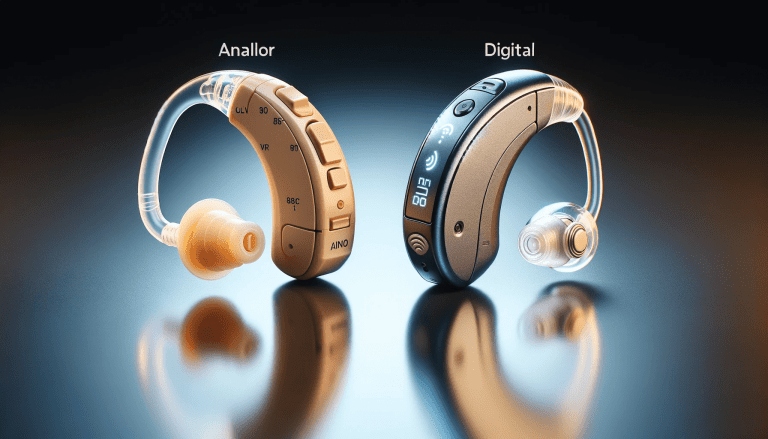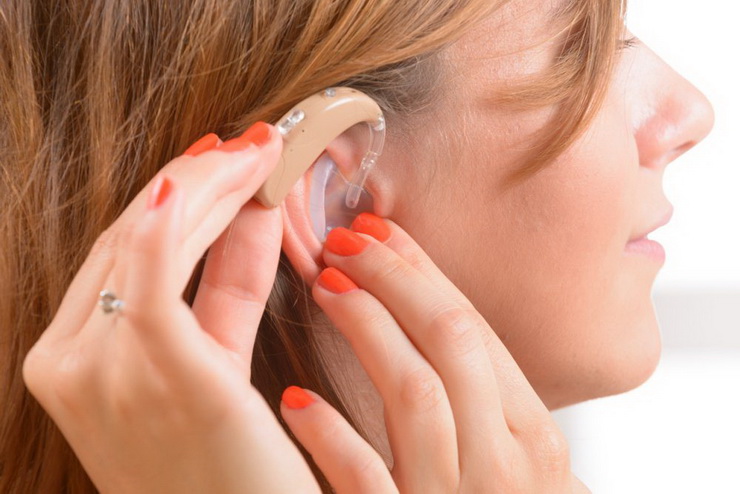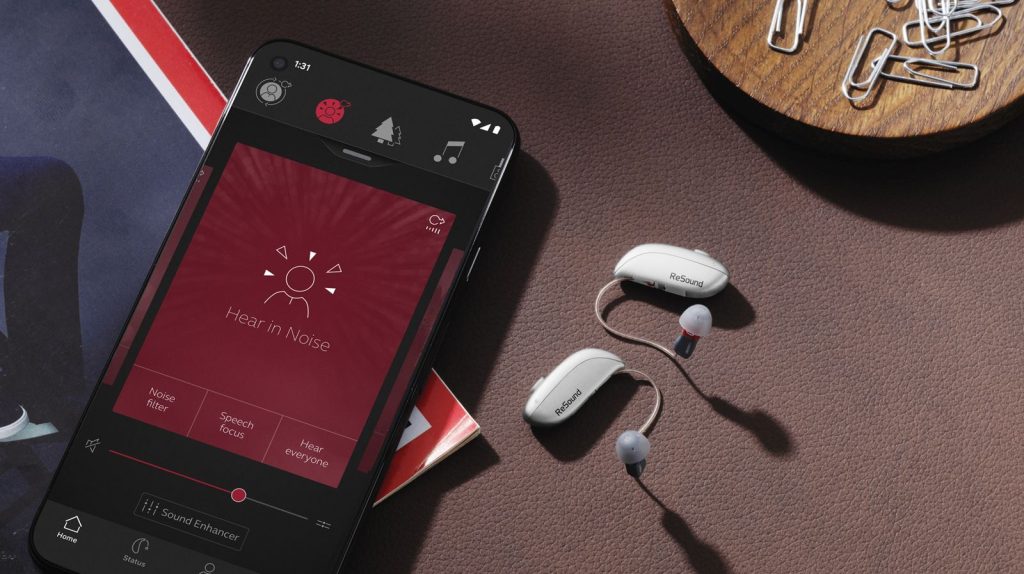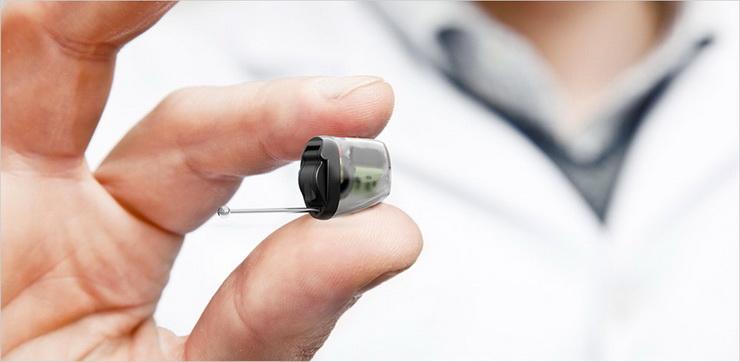- General
- Updated on November 6, 2023
What is Difference Between Analog And Digital Hearing Aids

Analog hearing aids and digital hearing aids, what exactly are they? Let’s delve into the intricate world of auditory devices and explore their distinctive features.
What are Analog Hearing Aids?
Analog hearing aids, known for their time-honored legacy, have been utilized by individuals with hearing impairments for decades. These devices operate on a fundamentally simplistic principle, converting sound waves into electrical signals, which are amplified and transmitted to the user’s ear.
It is the traditional yet reliable option that has been assisting individuals with hearing impairments for ages. These devices amplify sound waves, making them louder and more accessible to the user. However, their simplicity and straightforwardness may leave some wondering about their limitations and potential drawbacks.

What are Digital Hearing Aids?
Digital hearing aids have revolutionized the realm of auditory assistance. By employing cutting-edge technology— these devices exhibit an unparalleled level of precision and versatility.
It processes sound waves through complex algorithms, meticulously analyzing and modifying them to suit the specific needs of the user. This advanced processing capability enables digital hearing aids to discern between different types of sounds, optimizing the listening experience by selectively amplifying frequencies while suppressing others.
Furthermore, digital hearing aids often boast additional features such as noise reduction and feedback cancellation— further enhancing their efficacy.

Difference between Analog and Digital Hearing Aids
The main difference between these two types lies in their method of processing sound signals and their level of customization. Here are some key distinctions:
1. Sound Processing:
Analog hearing aids continuously amplify sound signals, meaning they enhance all sounds equally without distinguishing between different frequencies. On the other hand, digital hearing aids convert sound waves into digital signals, which allows for more sophisticated processing. These devices can analyze and selectively amplify specific frequencies, making them more efficient at improving hearing clarity.
2. Customization:
Digital hearing aids offer a higher level of customization compared to analog ones. An audiologist can program them to adjust to a person’s unique hearing needs. This customization includes adjustment of amplification levels, noise reduction, feedback cancellation, and other features. Analog hearing aids, however, typically have fixed amplification levels and cannot adapt to different listening environments.

3. Noise Reduction:
Digital hearing aids have advanced noise reduction capabilities that can help in filtering out background noise, improving speech intelligibility, and enhancing overall listening experiences. Analog hearing aids, on the other hand, do not have sophisticated noise reduction technology and may have a more limited ability to separate speech from background noise.
4. Battery Life:
Analog hearing aids tend to have longer battery life compared to digital ones. This is because digital hearing aids require more power to process and amplify sound signals, which can drain the battery more quickly. However, advancements have made digital hearing aids more power-efficient resulting in improved battery life in recent years.
5. Cost:
Analog hearing aids are generally cheaper compared to digital hearing aids. The price varies depending on the specific model and brand. Digital hearing aids are usually more expensive due to their advanced features, customization options, and higher-quality sound processing.
Analog vs. Digital hearing Aids: Which is better?
The choice between analog and digital hearing aids depends on various factors and individual preferences. Here is a comparison of both:

Analog Hearing Aids:
⦁ Simplicity: Analog hearing aids are generally simple in design and operation.
⦁ Sound Quality: Some people prefer the sound quality of analog devices as they produce a more natural sound.
⦁ Cost: Analog hearing aids are often less expensive than their digital counterparts.
⦁ Adjustments: They have limited programmability and may require manual adjustment by the user to suit different listening environments.
⦁ Background Noise: Analog devices may have difficulty reducing background noise efficiently.
Digital Hearing Aids:
⦁ Sound Processing: Digital hearing aids use advanced sound processing technology, allowing for precise amplification and customization.
⦁ Programming: Professionals can adjust and program digital devices to fit individual hearing needs and preferences.
⦁ Noise Reduction: Digital hearing aids often feature noise reduction algorithms, which can help to reduce background noise more effectively.
⦁ Directional Microphones: They can enhance specific sounds or speech from directions while reducing background noise from other directions.
⦁ Automatic Adjustments: Digital hearing aids can automatically adapt to varied listening situations, making them more convenient for users.
Ultimately, what works best for you will depend on your unique hearing requirements, preferences, budget, and the guidance of a hearing healthcare professional.
How are hearing aids beneficial for seniors?

1. Improved communication:
Hearing aids amplify sounds, making it easier for seniors to hear and understand conversations. This can enhance their ability to connect with loved ones, engage in social activities, and maintain relationships.
2.Increased safety:
Better hearing allows seniors to be aware of their surroundings, making them less prone to accidents or potential hazards.
3. Enhanced cognitive function:
Difficulty hearing can lead to cognitive decline and increase the risk of dementia. By addressing hearing loss with aids, seniors can maintain better cognitive abilities, memory, and mental functions.
4. Better emotional well-being:
Untreated hearing loss often leads to feelings of isolation, depression, and anxiety. Hearing aids can help seniors increase their confidence, engage in social interactions, and improve their overall emotional well-being.
5. Improved quality of life:
Hearing aids enable seniors to participate in various activities, including hobbies, group discussions, and entertainment events.
6. Preventive health benefits:
Addressing hearing loss early with hearing aids may have positive effects. It may reduce the risk of falls, as improved hearing helps maintain balance and spatial awareness.
Maintenance and Care for Analog and Digital Hearing Aids

Analog aids are generally less complex than digital aids, requiring less maintenance. Here are some maintenance and care tips for analog hearing aids:
⦁ Keep them clean: Regularly clean the hearing aid using a soft, dry cloth or a specialized cleaning brush. Avoid using cleaning solutions.
⦁ Change the wax guard or filter: Analog aids often have a wax guard or filter that can become clogged with earwax. Follow the manufacturer’s instructions.
⦁ Remove batteries: When not in use, remove the batteries to prevent power drain and potential damage from battery leakage.
Digital aids are more technologically advanced and may require more specific maintenance. Here are some tips for maintaining and caring for digital hearing aids:
⦁ Clean regularly: Clean the device as recommended using specialized tools or cleaning kits. Avoid using water, alcohol, or harsh chemicals.
⦁ Manage humidity: Excessive moisture can damage digital aids. Use a hearing aid dehumidifier or a dry storage container to remove moisture overnight.
⦁ Change filters and domes: It’s important to regularly replace the filters and domes of digital hearing aids to ensure proper function.
⦁ Handle with care: Protect the device from drops, impacts, and exposure to extreme temperatures. Avoid wearing the aids in the shower, while swimming, or during intense physical activities.
⦁ Regular check-ups: Schedule regular appointments with your audiologist or hearing healthcare professional for professional cleaning, adjustments, and maintenance checks.
Battery life Comparison Between Analog and Digital Devices
Analog devices typically have simpler circuits and components, which consume less power compared to their digital counterparts. It can operate for extended periods without needing frequent battery replacements.

Mature female doctor hearing specialist in her office trying hearing aid equipment to a patient elderly senior woman. The doctor laryngologist explains to senior woman how to wear a hearing aid
Digital devices, such as smartphones, tablets, and laptops, require more power due to their complex microprocessors, displays, and connectivity features. These devices often require daily charging or have battery life limited to a few hours or days, depending on usage.
It’s worth noting that advancements in technology and energy efficiency have led to improvements in battery life for many digital devices. Manufacturers have developed power-saving modes and more efficient processors to extend battery life, but still, analog devices generally maintain an edge in this aspect.
Top 5 best hearing aids under 3000

Phonak Audeo Paradise P30:
This hearing aid offers excellent sound quality, noise reduction, and connectivity features at an affordable price. It is appropriate for those who have mild to severe hearing loss.
Signia Pure 312 X:
Known for its advanced technology and compact design, this hearing aid provides natural sound perception and enhanced speech understanding. It is suitable for individuals with various types of hearing loss.
Oticon Opn S1:
This hearing aid offers outstanding speech clarity, background noise reduction, and personalized sound settings. Individuals with mild to severe hearing loss should opt for this.
ReSound LiNX Quattro 7:
This hearing aid utilizes state-of-the-art technology to provide clear sound quality, excellent speech understanding, and connectivity features. It is ideal for those who have mild to severe hearing loss.
Widex Moment 440:
This hearing aid offers a natural sound experience, clear speech understanding, and personalized sound adjustments. It is ideal for mild to severe hearing loss.
Join the discussion
Related Articles
No results available
ResetTrending Articles


- General
- Updated on July 8, 2025


- General
- Updated on July 7, 2025


- General
- Updated on July 8, 2025


- General
- Updated on July 4, 2025


- General
- Updated on July 2, 2025


- General
- Updated on June 30, 2025


- General
- Updated on July 1, 2025


- General
- Updated on June 28, 2025


- General
- Updated on June 30, 2025


- General
- Updated on June 27, 2025
No results available
Reset


